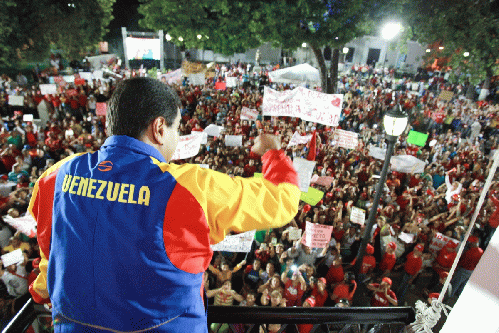In his second article on an affective picture of Chavismo, Reinaldo Iturriza reflects on the dangers of a "resigned loyalty," and how it generates a gap between the Chavista bases and leadership.

Maduro during a 'street government' session in Carabobo State, June 2013. (AVN)
(Image by venezuelanalysis.com) Details DMCA
In October 2013 I wrote a few lines about a phenomenon which I saw as one of the biggest dangers, if not the biggest, that the Bolivarian Revolution faced in the chapter that opened following the death of Hugo Cha'vez: a resigned loyalty.
Six months after I joined President Nicola's Maduro's first cabinet [in 2013], assuming the Ministry of Communes and Social Movements, it was clear that this micro-climate prevailed in many decision-making spaces. At the time, I thought it was my responsibility to address it publicly with the goal of warning about its possible political effects.
I alerted at the time that resigned loyalty was typical of some characters who missed no chance to vow that under no circumstance would they dare betray Cha'vez's legacy, an expression that was in vogue at the time, and they would likewise pledge to fight to the very end. This had the troubling implication, not explicitly manifested, that the end was imminent or, in the worst case scenario, had already passed.
The implicit message of those loyal but resigned was that without Cha'vez's leadership it would be impossible to move forward on the revolutionary path. Looking back, in some cases this wasn't even seen as a negative assessment, but rather as a unique opportunity.
The political flipside of resigned loyalty is the most clumsy political pragmatism. Once pragmatism is installed as the way of doing politics, the goal becomes to hold on, and the possibility to move forward is abandoned. The pragmatist looks to hold on to what exists. His goal in life is no longer to change things and he acts to preserve them. In that sense, pragmatism is essentially conservative.
When Cha'vez was around, the pragmatists talked about socialism, forced by an environment they surely found oppressive. But around this time they felt at ease, liberated, and could even afford to question the viability of this revolution's socialist horizon. Once the horizon is renounced, a strategic closing is automatically produced. Politics is reduced to permanent tactics in order to overcome, at a high cost, one crisis after another.
The resigned loyalty of a large part of the Chavista ruling class didn't just contrast with which would be an elegant way to put it but directly clashed with the spirit of the majority of the Chavista social base.
There was, of course, a lot of sadness among the people, something which President Maduro rightfully warned about, in one of the repeated occasions in which he reflected publicly on the matter. There was also, and this I perceived time and again on the streets in direct contact with the people, many doubts, often justified, about our ability to fill Cha'vez's shoes, to continue doing politics in a genuinely Chavista way. I believe the intense exercises of "street government" in 2013 were very significant, at least for a while, in dispelling most of these doubts.
Then, like now, the Chavista people felt a deep unease with the state of things and fought to change them. They were still moved by a fundamentally revolutionary spirit: they wanted to change everything that needed changing. They were still moved, to quote Gramsci, by an unbreakable "spirit of rupture" (1).
The reference to Gramsci is not by chance. In April 2013, as I studied the objectives that my team in the Ministry of Communes and Social Movements needed to achieve, President Maduro ordered us to work to create every possibility of a hegemonic democratic and popular rupture. The risk was clear, as was our responsibility to face it. Six months later, it was just as clear that the Chavista political class did not share the same spirit.
This absence of a "spirit of rupture" was expressed many times in the body that was tasked with forging it: the "Modern Prince," in other words, the [governing] party (the United Socialist Party of Venezuela, PSUV). Gramsci wrote: "The Modern Prince must be and cannot but be the proclaimer and organiser of an intellectual and moral reform, which also means creating the terrain for a subsequent development of the national popular collective will towards the realisation of a superior, total form of modern civilisation."
Gramsci's reasoning on the importance of intellectuals is widely known: the people "feel," but do not always "understand" or "know." On the other hand, intellectuals "know," but do not always "understand" or "feel" the popular aspirations. The role of the Modern Prince, as a collective intellectual, would be to ensure that connection: "One cannot make politics-history without this passion, without this sentimental connection between intellectuals and people-nation. In the absence of such a nexus, the relations between the intellectual and the people-nation are, or are reduced to, relationships of a purely bureaucratic and formal order; the intellectuals become a caste, or a priesthood."
In the Venezuelan case, this notable absence of a "spirit of rupture" from the Chavista political class, both in government and in different levels of the party's leadership, which would consolidate itself from 2016 onwards following the defeat in the parliamentary elections, lent itself to a very peculiar situation. On the one hand, a people converted into a national popular collective will who feel, understand and know. On the other, a loyal, yet resigned, leadership, with a tremendous difficulty in knowing, understanding and feeling the aspirations of the Venezuelan people, turned as such into something very similar to a church with very few worshippers.
The explicit reservations expressed by the leadership about popular capabilities; its accommodated interpretation of what socialism looks like; not to mention its overt surrendering of an anti-capitalist transformative horizon; its priority in establishing alliances with capital, leaving aside the organized people; its tendency towards privatizations, among other phenomena, would be the corollary of this affective disconnect that already announced itself in 2013.
(Note: You can view every article as one long page if you sign up as an Advocate Member, or higher).





